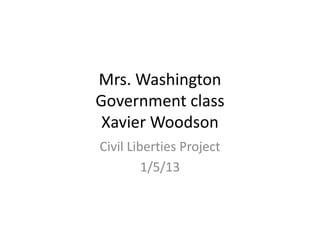
Xavier woodson civil liberties project
- 1. Mrs. Washington Government class Xavier Woodson Civil Liberties Project 1/5/13
- 3. Miranda vs. Arizona • In 1963, Phoenix Arizona, police officials arrested Ernesto Miranda as a possible suspect for kidnap and rape. • Ernesto, who only had a junior high education and mental problems, was brought in for a police lineup and possible questioning. • After 2 hours of questioning Ernesto confessed to the crimes in writing and was put in jail until his trial date.
- 4. Miranda vs. Arizona • At Ernesto’s trial, the case was based solely on his written statement, in which he was convicted and sentenced to 30 years in prison. • The Mexican immigrant appealed to the Arizona Supreme Court claiming the “police had unconstitutionally obtained his confession” • The court still ruled against him and upheld his conviction.
- 5. Miranda vs. Arizona • In 1966 Ernesto appealed to the U.S Supreme Court, in which they reviewed the case and gave him a chance. • Chief Justice Earl Warren, ruled out the confession as evidence in the criminal case because the police failed to inform Ernesto of his right to an attorney and against self incrimination. • The Constitutions 5th amendment, gives the criminal suspect the right to refuse to be a witness against ones self, The 6th amendment guarantees the defendant or criminal suspect the right to an attorney.
- 6. Miranda vs. Arizona • The court made it clear that the 5th amendment has been apart of American law for the longest. “it is a means to equalize the vulnerability inherent in being detained”. • The court also cited that the police officials used violence or abused their powers to compel confession’s from Mr. Miranda • Chief Justice Earl Warren stated “they deprived the criminal of his basic liberties which can lead to false confessions, if the defendants attorney is present in the interrogation room with him then that should enable him to tell his story without fear of the interrogation process”.
- 7. Miranda vs. Arizona • Its clear that without the two fundamental rights of the 5th and 6th amendments the court ruled that “it dispel the compulsion inherent in custodial surroundings,” “no statement obtained from the defendant can truly be a product of his free choice” • The court then required all police enforcers to read any detainees their “Miranda Rights”. • The Miranda Rights begin with “You Have the right to remain silent, anything you say can and will be used against you in the court of law, you have the right to a attorney, if you cannot afford one we will appoint one to you”.
- 8. Miranda vs. Arizona • Because the police failed to read Ernesto his rights, his conviction was reversed. • Ernesto and his confession was unconstitutionally admitted at trial therefore none of the evidence (which was only his written confession) could not be brought to his new trial. • Still, Miranda was later retried and convicted.
- 9. Miranda vs. Arizona • In my opinion, I think Miranda rights are just another way of letting police officers hold you and ask you anything until they feel satisfied. • I feel as if Mr. Miranda was convicted still based on his confession even though it was not admissible when he was retried in court. • Ernesto Miranda died January 31, 1976 from wounds of a knife during a brawl in the prison. He was 34 years old.
- 10. Miranda vs. Arizona • www.doney.net • www.atyourage.com • www.about.com • www.chacha.com